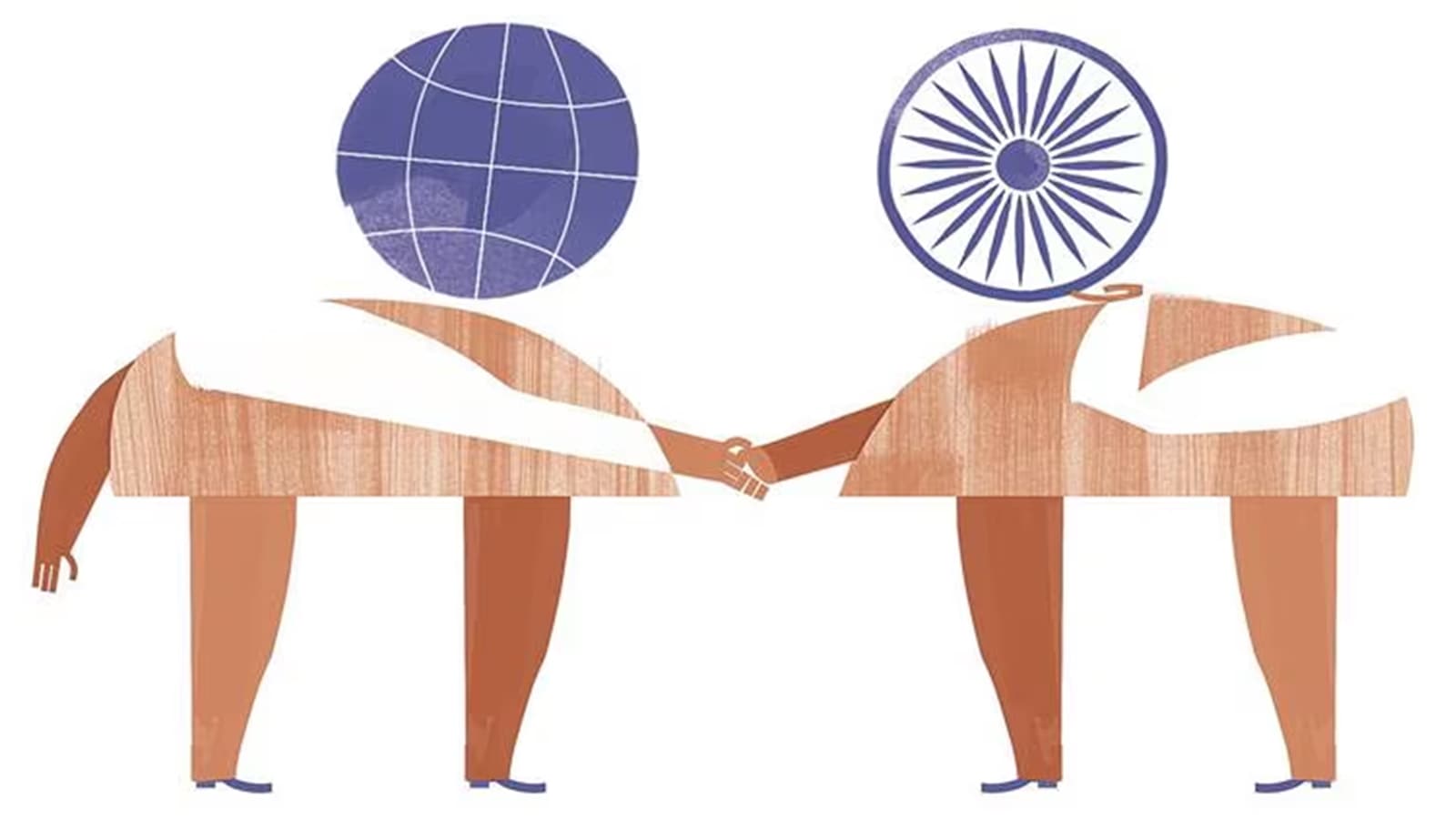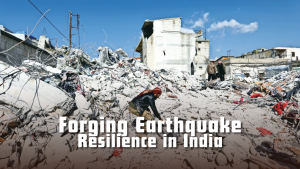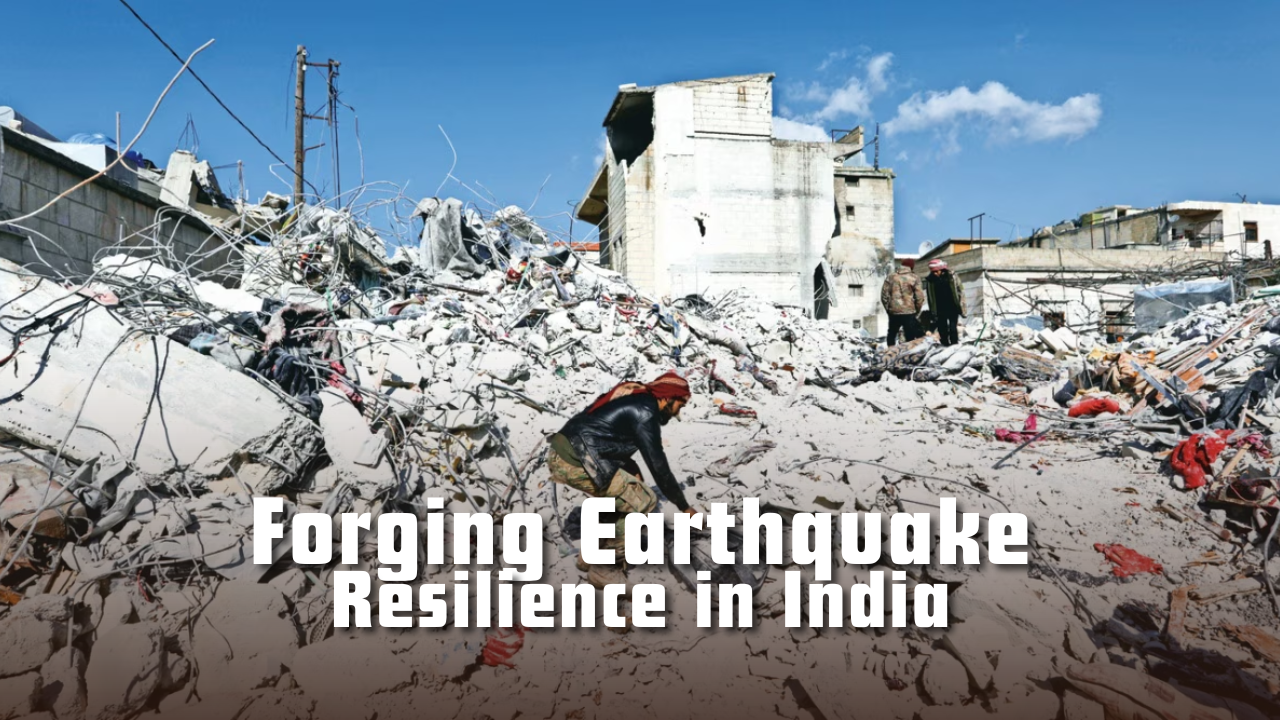India’s Foreign Policy: Beyond Hyper-Nationalism
A critical response to Pratap Bhanu Mehta’s view on nationalism and diplomacy, urging a balanced, context-rich foreign policy for India.

Contours of Credibility: Reframing India’s Foreign Policy
Introduction
Indian foreign policy, as examined by Pratap Bhanu Mehta in his notable article “A World of Our Making” (The Indian Express, 17 July), is portrayed as standing at a critical juncture, beset by both clear and hidden challenges. Mr. Mehta theorises that hyper-nationalist fervour has clouded India’s realism, weakening its diplomatic stance and diminishing its credibility on the world stage. He critiques the persistent celebration of supposed foreign policy triumphs without an honest engagement with external perceptions or underlying problems, specifically after events such as Operation Sindoor.
Yet this deeply thoughtful critique merits a robust challenge. While we must acknowledge Mehta’s insight and the clarity of his vision, it also overlooks significant diplomatic successes and fails to fully appreciate the limits imposed by a volatile global landscape. Further, deeper analysis reveals that Mehta’s arguments are shaped by a particular strain of cultural politics—one that, perhaps unintentionally, judges Indian actions by Western-centric norms.
This essay brings these different views together into a single, meaningful dialogue. It respects the strength of Mehta’s warnings, provides clear and logical counterpoints, uncovers the cultural and political ideas that shape his argument, and looks for ways to blend these perspectives. Ultimately, it aims to reshape the conversation, calling for a more thoughtful, context-rich review of India’s role on the world stage.
Mehta’s Arguments
Pratap Bhanu Mehta’s evaluation of Indian foreign policy is, at its core, a testament to the essential role of realism and intellectual honesty in statecraft. He argues that India, by succumbing to hyper‑nationalism and prioritising image management, has shied away from confronting difficult truths. As Mehta observes, the enthusiasm with which domestic audiences hail diplomatic efforts—such as Operation Sindoor—is sharply contrasted by the muted, formulaic, and often indifferent reactions from the wider international community
He argues that India’s belief in its own righteousness blinds it to how its actions are seen abroad. Rather than generating genuine international backing, Indian diplomacy—particularly since Operation Sindoor—has become increasingly isolated, earning nothing more than routine, non‑committal condemnations instead of firm advocacy or moral leadership. Mehta attributes this to insufficient strategic communication and a lack of objective self‑reflection .
Mehta goes further by examining India’s role in disputed regions like Balochistan and Kashmir—where proxy violence and religiously targeted actions blur the lines of conflict. He contends that such involvement fosters global weariness towards South Asian crises, eroding the moral clarity India hopes to project.
He also emphasises the unique dangers of India–Pakistan nuclear tensions. While both sides assume control over any escalation, the world fears miscalculation. As Mehta cautions, even a small error could shift India from being a respected power to “a problem for the world”, thereby forfeiting its moral high ground.
At the heart of these diplomatic challenges, Mehta identifies a failure of realism. He suggests that the government’s version of “realism” is nothing more than a reworking of old narratives, falsely equating closeness with powerful nations—especially the United States—with genuine global stature. He warns that this illusion of success undermines India’s pursuit of authentic strength, perpetuating myths and weakening its capacity for strategic renewal.
In summary, Mehta’s argument is a call for more profound self-reflection—a habit of examining not only outcomes, but also intentions and methods. He believes that only by letting go of comforting illusions can India regain true credibility and develop a mature, objective foreign policy.
Counter-Arguments
While Mehta’s critique serves as a necessary warning, there are substantial and well-founded reasons to dispute some of his central claims.
First, the alleged erosion of India’s diplomatic credibility may be overstated. The issuance of “boilerplate” international statements, far from being unique to India, is commonplace in global diplomatic practice. Major powers such as the United States, China, and members of the European Union routinely receive similarly restrained responses during international incidents. In this sense, expecting unwavering, public support on complex matters is to misread the measured dynamics of global engagement.
Beyond the optics of joint statements, the real currency of credibility lies in sustained bilateral relationships—in security, technology, and economics. In the past decade, India’s ties with key global actors such as the United States, Australia, Japan, and the European Union have endured and deepened. These under-the-radar alliances quietly bolster strategic interests and display enduring international confidence, contrary to the narrative of total diplomatic loss.
Moreover, criticising the interweaving of nationalism and foreign policy as uniquely Indian misses a global reality. Democracies worldwide are subject to domestic pressures; foreign policy is invariably shaped by the need for societal validation. To dismiss every expression of national pride as jingoistic bravado is to ignore the legitimate drive to cultivate morale, unity, and democratic participation.
On the question of regional decline, Mehta attributes too much to Indian shortcomings while neglecting the agency and local dynamics of neighbouring countries. Bangladesh, Nepal, Sri Lanka and others act from their own interests and have shown a growing capacity to negotiate relationships with multiple powers. India’s approach—rooted in democracy, culture, and aid—offers a slower but surer counterpoint to predatory great-power tactics. The pursuit of consensual partnerships, rather than buying loyalty, is itself a mark of steadiness.
Lastly, India’s supposed foreign policy “incoherence” often masks a pragmatic flexibility. The absence of an explicit doctrine allows room for manoeuvre amidst a turbulent, multipolar world. India’s ability to engage with varied actors—whether the United States or Russia, Israel or Iran—without aligning too rigidly ensures security and autonomy. This tradition of balancing objectives and managing risk has so far shielded India from the pitfalls of rigid ideological posturing.
A fuller appreciation of India’s external policy must acknowledge continual adaptation in the face of severe constraints. While introspection is vital, the narrative of terminal decline, as suggested by Mehta, does not do justice to the ongoing achievements and creative adaptations of contemporary Indian diplomacy.
Cultural-Politics Exposé
Beneath the surface of Mehta’s analysis lie deeper cultural and political assumptions worth exploring. Although framed as post‑colonial introspection, his arguments often judge India’s actions against standards set by a global order that has historically sidelined post‑colonial voices.
In Mehta’s critique lies an intellectual deference to an international community still heavily influenced by Western liberal norms. He expects India to “perform better” than established powers—whether on Pakistan, Gaza, or nuclear deterrence—creating a double standard. Yet Western nations themselves, including the United States and members of the European Union, regularly set aside their moral principles in favour of strategic interests. For example, they maintain strong relations with countries that have questionable human-rights records, without facing the same reputational scrutiny that Mehta thinks inevitable for India.
Moreover, Mehta’s conviction in the necessity of Western recognition for Indian moral legitimacy preserves what critics describe as a “neo-colonial” hierarchy. His disappointment at India’s silence on crises such as Gaza, while sincere, arguably holds India to an unrealistic standard, failing to apply the same level of scepticism to the West’s own inconsistencies. The realpolitik of international relations means that all significant powers, when required, subordinate idealism to pragmatic interests; India’s so-called “moral abdication” is hardly unique.
On the issue of nuclear responsibility, too, Mehta’s apprehensions seem to echo an older narrative where only the West is presumed fit to steward existential technologies. He does not subject American or Russian nuclear behaviour to the same scrutiny, yet assumes that India’s actions are uniquely suspect within the global order. Such framing, though doubtless unintentional, reinforces a hierarchy where India must constantly justify itself—perhaps even more so than its former colonial masters.
Lastly, the style of Mehta’s critique is steeped in cosmopolitan idealism, often dismissive of popular expressions of national pride and aspiration. The lived realities, expectations, and historical grievances of 1.4 billion Indians deserve more than passing sympathy. The argument that only a small, internationally oriented elite is fit to judge national policy marginalises the growing power and legitimacy of democratic, grassroots Indian voices.
In this sense, Mehta’s vision, while valuable as a corrective to triumphalism, risks replicating the same exclusionary outlooks he seeks to transcend. Disentangling Indian strategic thought from the constraints of inherited Western standards is vital if India is to shape a truly autonomous foreign policy.
Common Ground
However, one cannot but agree with Mehta that foreign policy must not become a vehicle for empty self‑praise. After all, triumphalism can blind leaders and the public to genuine risks and missed chances.
Equally, the importance of realism and honest self‑assessment is convincing. However, while Mehta calls for deep reflection, this must be rooted in the practical realities of a diverse, evolving India—not based on inherited pessimism or narrow external benchmarks. The aim should be a realism that is thoughtful yet not paralysed by doubt, open to critique but not reliant on Western approval.
The debate gains real value when viewed in light of their shared vision: India defining its own role globally. Mehta envisions a principled, credible India standing firm on moral and strategic grounds, while another school of thought imagines a nation guided by its own priorities, free from external moral scrutiny. Both outlooks aim for an India respected for leadership, adaptability and humility—achieved by different paths. A mature foreign policy blends these views, combining ambition with critical thinking, and self‑belief with openness to critique. This balanced approach calls for introspection that draws on a broad range of voices and India’s rich history. This resonates with S. Jaishankar’s 2020 book The India Way: Strategies for an Uncertain World, in which he outlines India’s navigation of a multipolar world by pursuing strategic autonomy and self-reliance amidst global complexities
A mature foreign policy must combine these views. It needs balance: ambition paired with clear thinking, and confidence tempered by openness to criticism. India’s future path lies in embracing self‑reflection while widening the sources and methods of its debate—drawing wisdom from the breadth of its people and its history.
Conclusion
By weaving together Mehta’s sharp warnings with thoughtfully argued alternatives—and examining the cultural assumptions behind his critique—this essay offers a fresh viewpoint on Indian foreign policy. It underscores the need for realism, honesty, and flexibility in global affairs, while cautioning against merely adopting external templates or succumbing to outdated pessimism
India is indeed a “world of our making.” To meet the complex expectations and responsibilities of this place, the country must embrace not only introspection, but also confidence—a confidence that is not deaf to criticism but is no longer beholden to distant powers for validation. Such a synthesis can advance a foreign policy both responsive to global realities and founded upon the plural, democratic energy of contemporary India.
Subscribe to our Youtube Channel for more Valuable Content – TheStudyias
Download the App to Subscribe to our Courses – Thestudyias
The Source’s Authority and Ownership of the Article is Claimed By THE STUDY IAS BY MANIKANT SINGH


